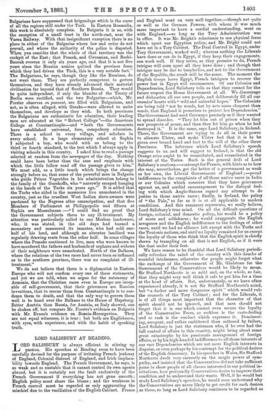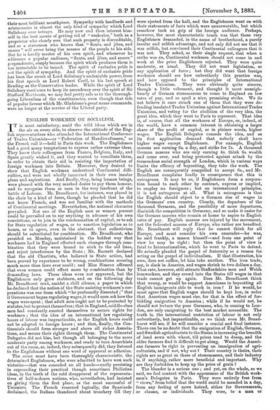LORD SALISBURY AT READING.
LORD SALISBURY is always efficient in stirring up passion. His speeches at Reading seem to have been carefully devised for the purpose of irritating French jealousy of England, Colonial distrust of England, and Irish implaca- bility towards England. The French Government, he says, is so weak and so unstable that it cannot control its own agents abroad, but it is certainly not the fault exclusively of the French Government if everything has not gone smooth ; English policy must share the blame ; and the weakness in French control must be regarded as only aggravating the mischief due to the vacillation of the English Cabinet. France
and England went on very well together,—though not quite as well as the German Powers, with whom it• was much more important to have a cordial understanding, went on with England,—so long as the Tory Administration was in office. It was Mr. Bright's reluctance to use physical force which upset our Egyptian policy, and Mr. Bright could not have sat in a Tory Cabinet. The Dual Control in Egypt, under Tory Government, worked well ; whereas nothing the Liberals have done or can do in Egypt, if they keep their engagements, can work well. If they retire, as they promise to do, French intrigue will soon upset all they have done ; and though that intrigue may be due to busybodies, and not to the Government of the Republic, the result will be the same. The moment the English troops leave Egypt, French intrigues to recover the power lost in Egypt will recommence. Of our Colonies and Dependencies, Lord Salisbury tells us that they cannot for the future respect the Home Government at all. We discourage and dishearten all our own people, and deliberately fill all our enemies' hearts with " wild and unlawful hopes." The Colonists are being told " not by words, but by acts more eloquent than words, that England is powerless to protect her Dependencies." The Government had used Cetewayo precisely as if they wanted to spread disorder. " They let him out of prison when they saw prospects of peace, and then they let him go when he had destroyed it." It is the same, says Lord Salisbury, in Ireland. There, the Government are trying to do all in their power to alienate Ulster, and mske Ulster feel that it is to be given over bound hand and foot to the will of the other three Provinces. The inference which Lord Salisbury's speech suggests to us, and will suggest to Ireland, is that the old Orange cries ought to be resuscitated, and resuscitated in the interest of the Tories. Such is the general drift of Lord Salisbury's orations,—contempt for France, with hints as to how she may, nevertheless, get the better of a government as weak as her own, the Liberal Government of England ;—proud indifference to the complaints of all those native races in India or our Colonies which conceive that they have grievances against us, and cordial encouragement to the disloyal feel- ing with which Anglo-Saxons regard any attempt to do justice to those native races ; finally, in Ireland, the policy of "the Pale," so far as it is at all applicable to modern conditions. And this summary represents, we really believe, Lord Salisbury's true mind. On all the difficult questions of foreign, colonial, and domestic policy, his would be a policy of scorn and selfishness ; he would exaggerate the English arrogance and the English indifference to the feelings of other races, until we had no alliance left except with the Turks and the Teutonic nations, and until no loyalty remained for us except the loyalty of those who think that the English spirit is chiefly shown by trampling on all that is not English, as if it were the dust under their feet.
We have reason to be thankful that Lord Salisbury periodi- cally refreshes the mind of the country with this douche of scornful intolerance, otherwise the people might forget what the exchange of the Government of Mr. Gladstone for the Government of the Conservatives would be likely to mean. Sir Stafford Northcote is so mild and, on the whole, so fair, that they might very well think it safe to put him for a time at the head of affairs. But, unfortunately, as we have often experienced already, it is not Sir Stafford Northcote's mind, but "a darker and more dangerous spirit" which would rule the counsels of the Tory Cabinet ; and for the Liberals, it is of all things most important that the character of that spirit should not be ignored, and that men should not forget that it is one which cannot even secure the loyalty of the Conservative Peers, so reckless is the caste-feeling and so rash is the conduct which expresses it. Domineer- ing, arrogant, and rather embittered than softened by failure, Lord Salisbury is just the statesman who, if he ever had the full control of affairs in this country, might bring about some great catastrophe by his passionate management of foreign affairs, or by his high-handed indifference to all those interests of our vast Dependencies which are not mere English interests in disguise, or even perhaps by his contempt for the political desires of the English democracy. In his speeches in Wales, Sir Stafford Northcote dwelt very earnestly on the magic power of sym- pathy, and insisted that the Conservatives did not take sufficient pains to show people of all classes interested in our political in- stitutions, how profoundly Conservatives desire to improve their condition and to understand their wants. Well, if he would but study Lord Salisbury's speeches, he would soon understand why the Conservatives are never likely to get credit for such desires as these, so long as Lord Salisbury continues to be regarded as their most brilliant mouthpiece. Sympathy with landlords and aristocracies is almost the only kind of sympathy which Lord Salisbury ever betrays. He may now and then interest him- self in the best means of getting rid of " rookeries," both as a proprietor who clearly sees that such property is discreditable, and as a statesman who knows that " flouts, and jibes, and sneers " will never bring the masses of the people to his side. But he is hardly master of his own spirit, and whenever he addresses a popular audience, "flouts, and jibes, and sneers" preponderate, simply because the spirit which produces them is too intractable to be tamed. The spirit of exclusive pride is not the spirit of sympathy. And the spirit of exclusive pride has been the secret of Lord Salisbury's undeniable power, from his first speech as Lord Robert Cecil, to his last speech at Reading as the Conservative leader. While the spirit of Lord Salisbury continues to keep its ascendency over the spirit of Sir Stafford Northeote, we may feel pretty safe as to the thorough- going Liberalism of the constituencies. even though that tide of popular favour which Mr. Gladstone's great name commands, were no longer at the service of the Liberal party.







































 Previous page
Previous page